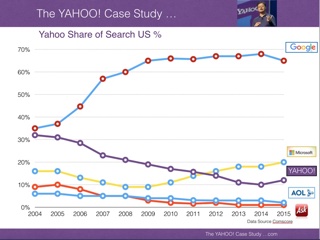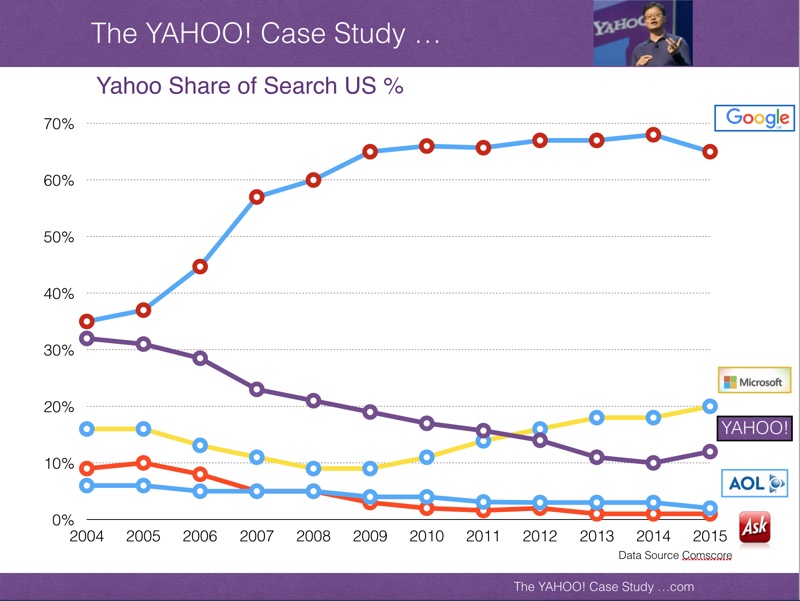 Yahoo and Google ... In the summer of 2002, Terry Semel CEO of Yahoo, approached Google with an offer to buy the company. Google founder Larry Page’s initial asking price was $1 billion quickly rising to $3 billion then $6 billion. It was obvious Page did not want to sell to Yahoo. The founders Larry Page and Sergey Brin wanted to keep the company independent. An IPO of their own was an easy and obvious option to cash up, in part exchange for equity. Semel was rebuffed. The back up plan was to create a rival to Google. Yahoo had already acquired Inktomi for $235 million. Overture had acquired Alta Vista for $140 million. Yahoo acquired Overture in July 2003 for $1.6 billion. The battle lines were drawn between Yahoo and Google. Initially the strategy proved successful. In 2004, the two brands were tied. According to ComScore, Yahoo held 32% of the search market and Google 35%. Yahoo had been the leader in search and online ads for years but now Yahoo had to contend with the Number two slot in a fast growing market. Within two years, Yahoo share of search had fallen below 30%. Google had pushed forward to achieve a 45% share, rising to over 65% by 2009. By 2014, Yahoo was struggling to hold a 10% share of search. Google was the clear market leader with a 70% share. The Google disruption in search was evident. Yahoo and Facebook … In 2006, Yahoo was still the big player on the internet block. Yahoo would see most, if not all deals, on the street. Terry Semel CEO had the chance to buy Facebook established just two years earlier for $1 billion. The Yahoo camp had mixed views about the deal. Some believed that if the campus based web site could be opened up to a wider audience, Facebook could become one of the most valuable social media platforms on the internet. Others had their doubts. The Yahoo protagonists believed the deal could value Facebook at up to $1.6 billion. In principle a deal had been agreed at the magic $1 billion level. A great deal for Zuckerberg after just two years. A great deal for Yahoo too. Semel’s tough love negotiations forced Zuckerberg to walk away from a meagre $850 million offer, never to return. Had Yahoo missed out? Undoubtedly. Within one year, Facebook had taken an investment from Microsoft valuing the company at $15 billion. In 2016, Facebook is valued at $340 billion. Google is valued at nearly $500 billion. Yahoo is valued at just over $35 billion largely due to the investment stakes in Yahoo Japan and Alibaba. Facebook’s share of display advertising surpassed Yahoo, just as Google has achieved in search. Yahoo and First Mover advantage … Yahoo had secured First Mover Advantage as the large internet portal. But first movers are often worst movers if the competitive market advantage is not pressed home. The scale of activity meant the giant could be out manoeuvred by focused start ups in selected areas. Yahoo was in danger of trying to do too much across the internet, without adequate focus in key sectors. The competitive framework was extensive. Google in search and PPC, Facebook in social networking and display ads. PayPal was dominating payment. eBay was emerging as the key name in auctions. Microsoft in email, MySpace in social AOL in messaging and CNN in news and sports. Yahoo had missed out on Google, Facebook, YouTube, LinkedIn and Twitter. Competitor platforms were established in Search, Advertising and Social. Yahoo acquisitions of Overture ($1.6bn) Flickr and Tumblr ($1.1bn) could not reverse the decline. The Yahoo case study is a classic example of Digital Disruption and many other of the key elements of our Masters Of Strategy Guidelines. Download the Case Study. Or why not check out our mobile version available as a YAPP! We really like the YahooYapp! Download and post a comment. Let us know what you think ... Don't miss our regular updates on Corporate Strategy in the Masters of Strategy Series. © 2016 John Ashcroft and Company, Economics, Strategy and Social Media, experience worth sharing. ______________________________________________________________________________________________________________ The material is based upon information which we consider to be reliable but we do not represent that it is accurate or complete and it should not be relied upon as such. We accept no liability for errors, or omissions of opinion or fact. In particular, no reliance should be placed on the comments on trends in financial markets. The receipt of this email should not be construed as the giving of advice relating to finance or investment..
1 Comment
|
John Ashcroft
Masters of Strategy on Digital Disruption from the Dimensions of Strategy Team ... experience worth sharing ... Archives
May 2023
Categories
|
- Home
- Artificial Intelligence
- Digital Disruption
- Digital Accommodation
- The Master Class
- The Case Studies
- Empires of the Cloud
- Letters to a Friend on Social Media ...
- The Tool Box
- Five Dimensions
- CRIMSON Clouds
- Market Mapping
- CBS News
- PESTEL framework
- Kaizen and KSFs
- Business Modelling
- 7 Ss Framework
- Crisis Management
- Secrets of a great presentation
- Business Planning
- Fishing in a Pond?
- About
- The Apple Case Study
- The Lego Case Study
- The Yahoo Case Study
- The Twitter Case Study

 RSS Feed
RSS Feed
